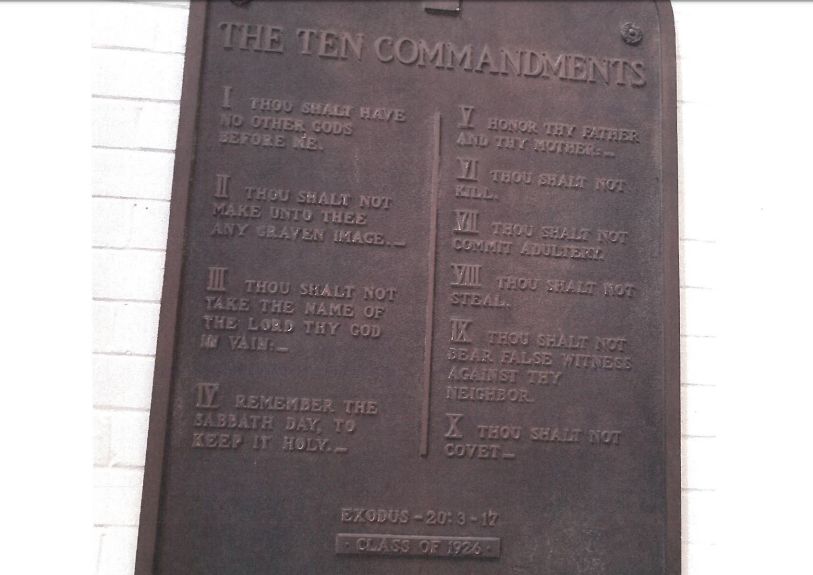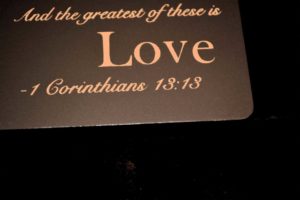 NEW PHILADELPHIA, Ohio — Although in disagreement, a public school district in Ohio has removed a Ten Commandments plaque from the walls of a middle school following a complaint letter from the Wisconsin-based Freedom From Religion Foundation (FFRF).
NEW PHILADELPHIA, Ohio — Although in disagreement, a public school district in Ohio has removed a Ten Commandments plaque from the walls of a middle school following a complaint letter from the Wisconsin-based Freedom From Religion Foundation (FFRF).
“In speaking with the district, it is my understanding that the plaque has been taken down and is no longer on display on district property,” wrote attorney Brian DeSantis, representing the New Philadelphia City School District, on June 19.
However, the district also said in a statement that it is does not appreciate how FFRF handled the matter, nor does it agree with the organization’s assertions as the district rather views the plaque as a historical piece within the school.
“Rather than meeting with the district to begin a dialogue, FFRF sent a letter from its office in Wisconsin and then used the local media to further the issue,” Superintendent David Brand told The Times-Reporter.
“Since receiving the letter, the district has gathered more information, listened to interested community members, and reviewed its options. As background, the plaque was a gift from the Class of 1926 to the district in 1927,” he outlined. “To the best of its knowledge, the district believes the plaque has been displayed in the district ever since.”
Brand said that as the plaque has been on display for more than 90 years, it is considered “part of the tradition and history of New Philadelphia City Schools.” However, he feels that Supreme Court precedent would have to be overturned in order for the district to prevail in a legal challenge and that a lawsuit in and of itself would be costly.
“Despite offers from local law professionals to help the district, the ‘costs’ of defending are substantial. In addition to funding multi-year litigation, the district will divert staff, time, and energy from the district’s true purpose — student learning,” he stated.
“Even more troubling, if the district’s case is unsuccessful as all other school cases have been, FFRF can seek for the district to pay FFRF’s legal fees, which have in at least one instance, exceeded $900,000.00. Clearly, challenging the issue legally would be an enormous risk and burden to the local taxpayers.”
Brand advised that the plaque will be donated to preserve its historic nature, and the district will consider filing an amicus brief in a similar case that is before the courts.
“While members of the district do not agree with FFRF’s conduct, the district believes acting on its own terms is the most effective way to oppose FFRF and to continue to serve its students,” he said.
As previously reported, in April, FFRF was contacted by a parent who advised that Welty Middle School in New Philadelphia had a Decalogue plaque near the entrance to its auditorium. The plaque cited the class of 1926 at the bottom.
The organization then sent a letter to attorney DeSantis to ask that the display be removed.
“This plaque is a flagrant violation of the Establishment Clause of the First Amendment,” FFRF’s letter claimed, contending that “no court has upheld the display of the Ten Commandments in a public school.”
The group also asserted that students and others would view the sign as an endorsement by the school, and those who are not Christian or Jewish would feel like outsiders.
“The district’s promotion of the Judeo-Christian Bible and religion over non-religion impermissibly turns any non-Christian or non-believing parent, student or staff member into an outsider,” FFRF wrote. “School children already feel significant pressure to conform from their peers. They must not be subjected to similar pressure from their school, especially on religious questions.”
On Thursday, FFRF cheered in a news release that the plaque had been removed.
“We applaud the district for taking action to remedy this violation,” said Co-President Annie Laurie Gaylor. “Students in our public schools are free to practice any religion they choose — or none at all. In America, we live under the First Amendment, not the Ten Commandments.”
 Romans 13 states that God’s law teaches mankind how to love one another.
Romans 13 states that God’s law teaches mankind how to love one another.
“Owe no man anything but to love one another, for he that loveth another hath fulfilled the law,” it outlines. “For this, ‘Thou shalt not commit adultery,’ ‘Thou shalt not kill,’ ‘Thou shalt not steal,’ ‘Thou shalt not bear false witness,’ ‘Thou shalt not covet,’ and if there be any other commandment, it is briefly comprehended in this saying, namely, ‘Thou shalt love thy neighbor as thyself.’
“Love worketh no ill to his neighbor; therefore, love is the fulfilling of the law.”
John Adams, second president of the United States, wrote in his diary on Feb. 22, 1756, “Suppose a nation in some distant region, should take the Bible for their only law book, and every member should regulate his conduct by the precepts there exhibited. Every member would be obliged in conscience to temperance and frugality and industry, to justice and kindness and charity towards his fellow men, and to piety and love, and reverence towards almighty God.”
“In this Commonwealth, no man would impair his health by gluttony, drunkenness or lust—no man would sacrifice his most precious time to cards, or any other trifling and mean amusement — no man would steal or lie or any way defraud his neighbor, but would live in peace and goodwill with all men. No man would blaspheme his Maker or profane his worship, but a rational and manly, a sincere and unaffected piety and devotion, would reign in all hearts.”
“What a Utopia, what a paradise would this region be,” Adams declared.
Read Adams’ writings here at the National Archives.
Become a Christian News Network Supporter...


